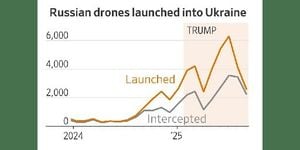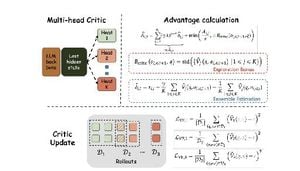On January 29, 2025, Chinese technology giant Alibaba launched its latest artificial intelligence (AI) model, Qwen 2.5-Max, claiming it significantly outperforms the DeepSeek-V3 model. This bold announcement was made on WeChat, where Alibaba's cloud division stated, "The Qwen 2.5-Max surpasses almost all aspects of GPT-4o, DeepSeek-V3, and Llama-3.1-405B," referencing advanced AI models from OpenAI and Meta.
The timing of this launch during the Lunar New Year holiday captures the rapid acceleration of competition within the AI sector, as Alibaba moves to counter the growing influence of startups like DeepSeek, which recently stirred the industry by achieving benchmarks previously dominated by larger firms. The significance of DeepSeek's technological prowess was underscored by the abrupt drop of over $1 trillion in market value across major tech companies after its recent gains.
According to reports, the innovations introduced by the DeepSeek models, particularly the DeepSeek-V2 launched last May, initiated aggressive price wars within the Chinese AI market. The DeepSeek-V2's open-source nature and competitive pricing, costing only 1 yuan (approximately $0.14) for one million tokens, pressured other tech giants, including Alibaba, to slash prices of their AI models by as much as 97%.
Liang Wenfeng, the enigmatic founder of DeepSeek, has noted on various occasions, "We are not concerned about pricing wars; our primary goal is achieving artificial general intelligence (AGI)." He elaborated on the company's focus on rapid innovation compared to larger tech firms with heavy organizational structures.
Alibaba's strategic response is twofold: launching Qwen 2.5-Max to reclaim market leadership, and introducing the Alibaba Cloud GenAI Empowerment Program aimed at aiding developers globally. This initiative promises benefits such as cloud credits, workshops, and access to new technologies, demonstrating Alibaba's commitment to fostering innovation and development within the AI community.
Despite deep-rooted competition, other companies, such as ByteDance, which owns TikTok, have also stepped up to the challenge. ByteDance recently unveiled enhancements to its own AI models, claiming improvements over OpenAI's innovative offerings. This multi-faceted competitive environment indicates not just the rapid evolution of technology but also the increasing pressure on established firms from agile startups.
The competition stretches beyond individual products; it reflects broader trends within the technology sector. The launch of Qwen 2.5-Max directly follows DeepSeek’s alarming emergence as it capitalized on market vulnerabilities and exposed the weakness of traditional tech giants. The backdrop of these developments raises questions about sustainability and profitability for entrenched players.
On the day of Alibaba’s announcement, the company saw its stock rise nearly 2%, contrasting with Nvidia's share price, which fell approximately 5%. Nvidia has struggled with challenges recently, including supply issues and fluctuated demand for GPUs needed for high-level AI computations.
Interestingly, this burgeoning competition has sparked discussions around safety and ethical concerns with AI models. Research has now revealed vulnerabilities within both DeepSeek and Alibaba's Qwen models. Cybersecurity firm Kela flagged vulnerabilities termed as "evil jailbreaks" which could allow users to circumvent safety protocols embedded within these AI systems.
Dr. Xiaolan Fu, founder of OxValue.AI, expressed concerns over the potential for AI-generated code to produce malware. "With the advances made by models like Qwen 2.5 and DeepSeek, there exists great risk if these capabilities land in the wrong hands," she remarked, driving focus back onto the responsibilities of developing safe and responsible AI technologies.
While Alibaba and DeepSeek rapidly utilize AI's potential to reshape technology as we know it, this arms race signals both evolution and potential unrest within the industry, reigniting debates on transparency and control of advanced AI.
With numerous startups lining up to stake their claim in this dynamic environment, the question looms: how will major players adapt and innovate to maintain relevance? For now, the competition promises to spur creativity and technological advances as businesses continue to respond to one another's strategies.
This latest wave of AI advancements places not only Alibaba but the entire Chinese tech ecosystem at the forefront of the global AI race, fundamentally shifting how companies engage and compete on technology.



